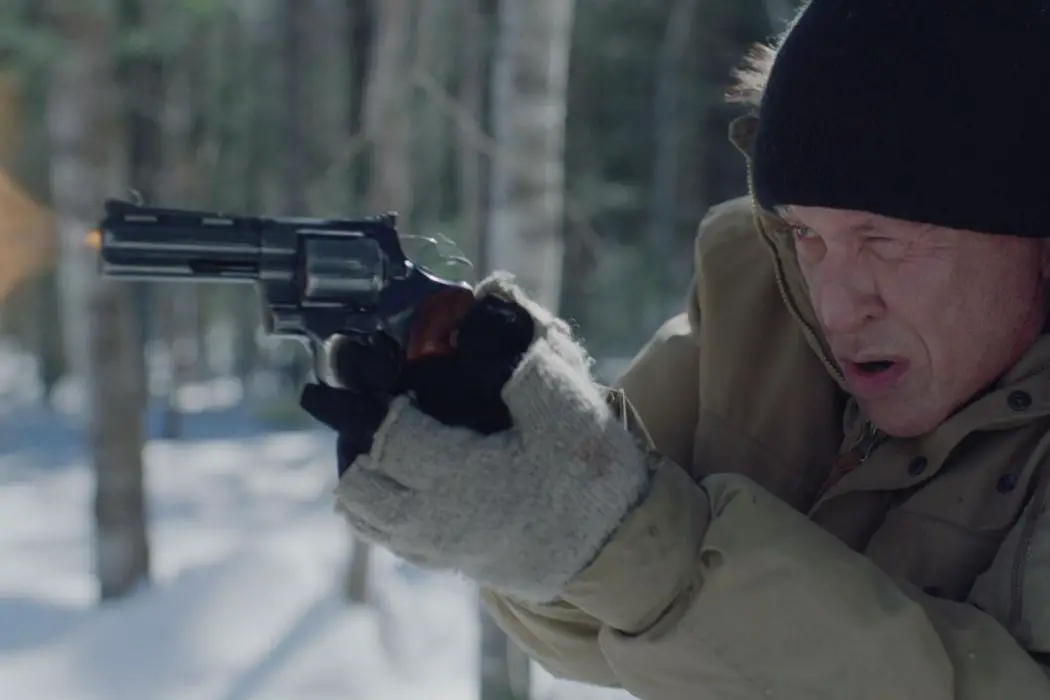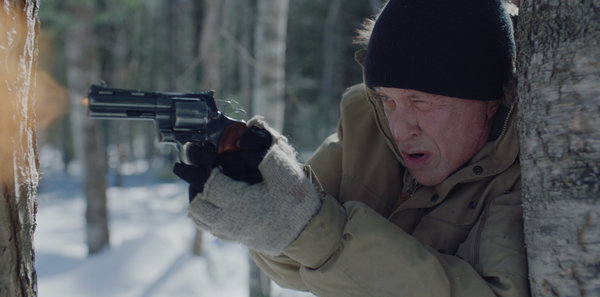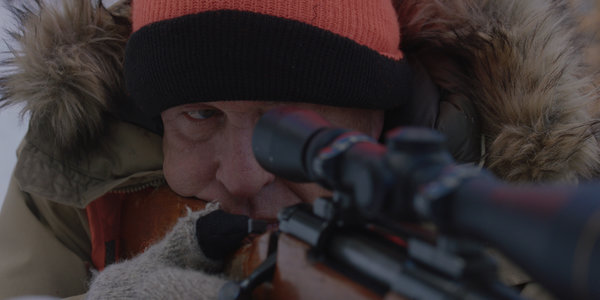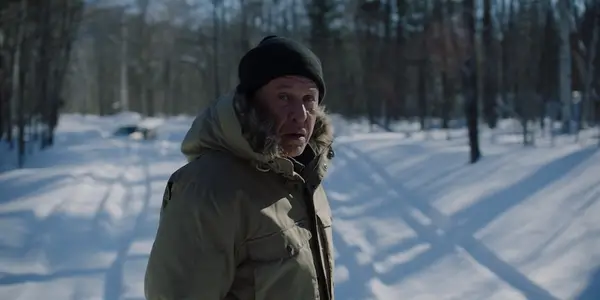BLOOD AND MONEY: Snowbound Thriller As Imaginative As Its Title

Former film student from Scotland turned writer and film reviewer.
It’s been over a decade since Luc Besson’s Taken debuted, single-handedly reinventing Liam Neeson’s career and jump-starting the ‘geriatric’ subgenre of action movies which Neeson himself still appears to be the centre of. In the decade since that movie, there have been highs and lows. For every Taken (and let’s not forget the ridiculousness of that movie, sometimes lost in the discussion about its impact on popular culture) there is a Non-Stop, for every A Walk Among the Tombstones, there is a Taken 3.
Of course, Neeson himself isn’t the sole benefactor of the geriatric revival: Sylvester Stallone has seen marked success with his Expendables series, as well as managing to resurrect one of his most famous characters in John Rambo, while Bruce Willis has been quietly trucking on with the likes of his Death Wish remake, as well as various direct-to-VOD work of varying quality.
There have been plenty of 70s/80s action stars ready and willing to jump on this bandwagon. Now we can add Tom Berenger to that list. Berenger, probably most famous as Sergeant Barnes in Platoon and Sam Weber in The Big Chill, has himself been quietly plodding along in the last decade, starring in a host of forgettable titles with the occasional diamond in the rough. Now he’s front and centre in a snowbound thriller about as imaginative as its title suggests: Blood and Money, for all the set-up seems promising, unfortunately adds nothing new to this subgenre. It is content to walk the same path trodden by dozens of movies before it, and not nearly well enough to stand out from the crowd.
Allagash
In Allagash, (the original title was supposed to be Allagash, and although it’s understandable why they would want to change it, it’s hard not to feel like Blood and Money was a lazy compromise) a quiet, snowy, barely inhabited town in northern Maine, life is rough. The snow is deep and heavy, the citizens seem to trundle around miserably, drinking their woes away. Early dialogue (and dialogue is as sparse as sunshine here) shows inhabitants desperate to escape the dreary town and the lives they’re living. Into this depressing existence steps Jim Reed (Berenger), a loner with a troubled past. Reed is an alcoholic living out of his camper van, spending his days hunting deer in the dense mountain forest around him. He is the typical sad-sack, quiet and brooding, that fuels these types of films. An early conversation at an Alcoholics Anonymous meeting reveals he was a former marine and the message seems clear: he’s vulnerable and frail, but still not someone to be messed with.

On a routine hunting expedition, Reed accidentally shoots a woman running through the forest, mistaking her for a deer. She is carrying a duffel bag full of cash, which Reed hides. He does this, ostensibly, because he doesn’t want to be culpable for her death. Reed panics and tries to figure a way out of this situation, but when five strangers show up in the mountains looking for the money Reed has no choice but to fight his way out.
Directed by John Barr, a former cinematographer making his directorial debut, it’s clear that atmosphere plays a major part here. The town of Allagash, and the forest above it, is well shot and this, coupled with the intense soundtrack, helps create a sense of loneliness and despair, which pervades the entire movie. We know where we are from the beginning moments, and the kind of tone being struck here. It’s unfortunate that the rest of the movie doesn’t really hold up to any kind of scrutiny. While other stars of the geriatric genre – Neeson, Willis, Stallone, Lundgren, etc – still look capable of taking down a 190-pound man with a well-placed punch, Berenger is 70 and looks every bit of that here. It stretches credulity in some scenes to see him tackling a man 40 years his junior with barely a scratch.

One scene sees him free-fall from a (albeit relatively short) cliff which would likely injure even the fittest of men, yet he gets up as though it were merely an inconvenience. As mentioned, this would be more acceptable if he appeared – as some of Berenger’s peers in the industry – to be fitter and healthier, but Reed is depicted from the outset (as he coughs up blood early on, we’re led to believe he has a terminal illness) as a frail man far from his best. To underscore this, there are moments when we are shown Reed struggling – for example falling into the freezing Allagash river after he kills a nameless henchman, he takes off his clothes and burns some of the money to keep warm, making him look all the more pathetic and incapable – which jars against what he is later capable of.
This is also true of his motivations, which seem oddly skewed. At the beginning, Reed shows remorse for accidentally killing a woman, and clearly struggles to deal with the psychological ramifications of his actions. Yet later he executes an unarmed young man (point-blank in the head) from just a few feet away and doesn’t even blink. He even attempts a double-tap (again in the head) after the body falls, but finds himself out of bullets. This cold-blooded action doesn’t tally with the earlier scenes and the change is too quick and unexplained to really settle.
A Cold Town
While Berenger does all the heavy lifting here, there is a small cast of characters to back him up. Kristen Hager plays Debbie, an overworked, stressed-out waitress who wants to leave all this behind, and Mark Sivertsen plays Ray, the leader of the criminals searching for their money, but honestly, no one really gets much in the way of character progression here. Debbie seems to exist for the purpose of providing an emotional anchor for Reed, a man with zero other real connections, while Ray is your typical bad guy who spouts unrealistic expository dialogue during moments when he really should just shut up and concentrate.

The setting of Allagash, a cold, forgotten town where it’s hard to imagine anyone does much but survive, could have made for an interesting location – and it’s true Barr does well to milk the isolated setting for atmospheric purposes – but there just isn’t all that much explored to make it worth your while. The characters are somewhat two-dimensional, the plot is wafer-thin, and there is no real discernible arc to any of it. By the end, we’re left wondering what has really been achieved with any of this, what outcome has made it worthwhile, what lessons were learned. It’s a very by-the-numbers potboiler which isn’t concerned with trying to do anything different and unfortunately, we’ve already seen everything Blood and Money has to offer, done much better elsewhere.
Conclusion
Blood and Money didn’t need to do all that much to satisfy fans of the geriaction subgenre who know what they want and aren’t all that hard to please. Yet it is so content to occupy the safe middle ground without ever doing anything of interest such as exploring its characters or its location, that it feels like an heartless exercise in mimicking better films just for the sake of it. Anyone who enjoys a good geriaction thriller would be better served elsewhere.
Blood and Money is another in the long line of geriaction movies. What are your favourites? Let us know in the comments below!
Blood and Money will be released in the USA on May 15.
https://www.youtube.com/watch?v=YKPMaXOfgbQ
Does content like this matter to you?
Become a Member and support film journalism. Unlock access to all of Film Inquiry`s great articles. Join a community of like-minded readers who are passionate about cinema - get access to our private members Network, give back to independent filmmakers, and more.













